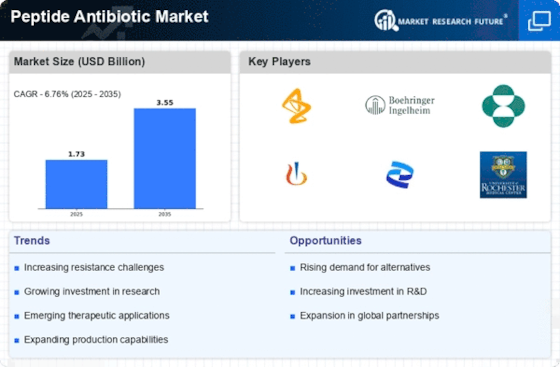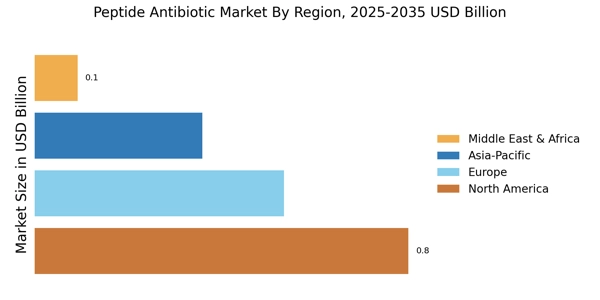Advancements in Biotechnology
Technological advancements in biotechnology are significantly influencing the Peptide Antibiotic Market. Innovations in peptide synthesis and modification techniques have enhanced the efficacy and stability of peptide antibiotics. These advancements enable the development of tailored antibiotics that can target specific pathogens with minimal side effects. Furthermore, the integration of artificial intelligence in drug discovery is expediting the identification of potential peptide candidates. As a result, the market is witnessing an influx of new products, with several peptide antibiotics currently in various stages of clinical trials. This trend suggests a robust future for the Peptide Antibiotic Market, as biotechnology continues to evolve and expand its applications.
Increasing Antibiotic Resistance
The rising prevalence of antibiotic resistance poses a formidable challenge to public health, thereby driving the Peptide Antibiotic Market. Traditional antibiotics are becoming less effective against resistant strains of bacteria, necessitating the development of novel therapeutic agents. Peptide antibiotics, known for their unique mechanisms of action, are emerging as promising alternatives. According to recent data, the peptide antibiotic segment is projected to grow at a compound annual growth rate of approximately 8% over the next five years. This growth is indicative of the urgent need for innovative solutions to combat resistant infections, thus propelling investments and research in the Peptide Antibiotic Market.
Investment in Research and Development
Investment in research and development is a pivotal factor propelling the Peptide Antibiotic Market. Pharmaceutical companies are increasingly allocating resources to explore the therapeutic potential of peptide antibiotics. This trend is driven by the recognition of the limitations of existing antibiotics and the urgent need for new treatment options. Recent data suggests that R&D spending in the antibiotic sector has increased by over 15% in the past year, with a notable focus on peptide-based therapies. This influx of investment is likely to accelerate the discovery and commercialization of novel peptide antibiotics, thereby enhancing the market landscape and addressing the pressing challenges posed by antibiotic resistance.
Rising Incidence of Chronic Infections
The increasing incidence of chronic infections, such as those caused by multi-drug resistant organisms, is a critical driver for the Peptide Antibiotic Market. Chronic infections often require prolonged treatment regimens, and the limitations of conventional antibiotics have led to a surge in interest in peptide antibiotics. These agents offer a novel approach to treating persistent infections, with studies showing their effectiveness against resistant strains. The market is expected to witness a surge in demand as healthcare providers seek effective solutions for managing chronic infections. Projections indicate that the peptide antibiotic segment could capture a significant share of the overall antibiotic market, reflecting the urgent need for innovative therapies.
Growing Awareness of Antimicrobial Stewardship
The increasing emphasis on antimicrobial stewardship programs is shaping the Peptide Antibiotic Market. Healthcare providers are becoming more aware of the need to use antibiotics judiciously to preserve their effectiveness. This awareness is driving the demand for alternative therapies, including peptide antibiotics, which are perceived as a viable solution to mitigate the risks associated with traditional antibiotics. As hospitals and healthcare systems implement stricter guidelines for antibiotic use, the market for peptide antibiotics is likely to expand. Recent studies indicate that hospitals adopting stewardship programs have reported a 20% reduction in antibiotic prescriptions, further underscoring the potential for peptide antibiotics in this evolving landscape.

















